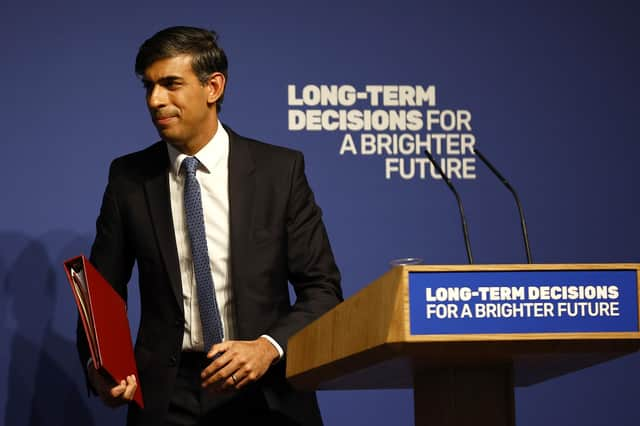Rishi Sunak needs to put country out of its misery and call an election - Brian Wilson


It might have been possible to feel a little bit of sympathy for Rishi Sunak when he learned another of his MPs has, in effect, been handed a red card by the House of Common Standards Committee.
But only for a moment. The Tories are reaping what they sowed when they converted dolts and bullies into Parliamentarians, largely on the basis of opinions which would disgrace any self-respecting saloon bar.
Advertisement
Hide AdAdvertisement
Hide AdThe latest to come to grief, Peter Bone, comes straight out of central casting for a role in “The Thick of It”; a publicity-hungry, pro-Brexit boor who was found by the Committee to have bullied, harassed and exposed himself to an unfortunate aide.
To add piquancy, Mr Bone was briefly Deputy Leader of the Commons, appointed by Boris Johnson, in which role he was responsible for investigating … er, bullying. Satirists struggle to compete. Even Liz Truss, whose leadership bid the raging Bone man supported, saw the irony and sacked him.
Confirmation of Mr Bone’s suspension from the Commons will lead to a recall petition which means a by-election and probably another Tory defeat with a majority of 18,540 swept away. It is a prospect which should encourage Mr Sunak to wonder if it is not time to put the country, and his party, out of their misery by calling a general election. At first sight, this may seem counter-intuitive. Why call an election when you’re certain to lose? However, that mantra only holds good if it seems likely that things can only get better when, actually, they might well get considerably worse. No need to look in the crystal ball when the 1990s seem increasingly like the template for Mr Sunak’s current run of misfortunes.
Prime Ministers who delayed holding elections because they were clinging to hopes of electoral recovery do not have a good record. Jim Callaghan, John Major, Gordon Brown were all left with time to reflect that taking a chance earlier might at least have limited the scale of defeats when judgment day could be avoided no longer.
I heard the Labour MP, Peter Kyle, who ran the Mid Bedfordshire by-election campaign, talking about the strategy which created that improbable victory. Right from the start, he said, the feedback told them that voters in their droves had already made their minds up about the Tories and would not support them again.
There was no need to keep attacking them because that part of the job had already been self-inflicted. Labour literature did not mention the Tories. Its objective was to persuade voters that they could comfortably move over to Labour as a prospective government, which they duly did in sufficient numbers.
That, I suspect, is true of the country as a whole. The critical “never again” verdicts were passed at the time of Brexit or Partygate or the Liz Truss debacle. They ran deep and are not going to be reversed whether the general election is held next month or at the last possible moment, in January 2025.
Indeed, the anti-Tory tide is at least as likely to attract new recruits, the longer this goes on. Once the perception of a dead government walking sets in, it only tends to go in one direction. Sunak’s ratings actually fell after his Tory conference re-launch. And how about lifting the cap on bankers’ bonuses as a recruiting sergeant for “anyone who can beat the Tories”?
Advertisement
Hide AdAdvertisement
Hide AdSo why not just get on with it and maybe get some credit for respecting the national interest and public mood, instead of clinging onto office for no particular reason? Many Tory MPs are already making that call on an individual basis and will not stand again.
If the Prime Minister awaits a Wellingborough by-election, following Mr Bone’s defenestration, and then the English and Welsh local elections in May, there is every possibility that his party’s standing will be even lower than at present, with time closing in on possible election dates. And still no sign of anything turning up on the economy.
Polling shows that three quarters of British voters want a general election by May; only 20 per cent are calling for one now, presumably because they think it is pointless to demand something that shows no sign of happening. So why not spring an element of surprise? When things still look just as bad by the spring, voters will be even more annoyed if Sunak insists on prolonging the agony.
In the interim, he is not going to turn into an inspiring leader or harbinger of a new beginning. On the contrary, Mr Sunak is firmly identified as a rather hapless symptom of the malaise rather than any part of the solution; a Brexiteer of convenience rather than conviction who was happy to go along with Boris Johnson, parties and all, until embarrassingly late in the day.
The Scottish Tories are among those who might sensibly encourage an early general election. Current polls suggest voters have had enough of governments in both London and Edinburgh, but maybe just a little more heavily weighted towards the latter. They predict the Tories would hold their Scottish seats and maybe gain a couple on the back of anti-SNP sentiment. There is no guarantee that this delicate balance of dislikes will last far into next year.
The political pendulum always swings, even if it takes a while to start moving. That is now happening in both Scotland and the rest of Britain, albeit with slightly different nuances. The most powerful slogan in politics is in play and it is “time for a change”.
As the headlines confirm, each month Mr Sunak gambles with will invite risk that things will only get worse – for his party and the country. He should call an election now.
Comments
Want to join the conversation? Please or to comment on this article.